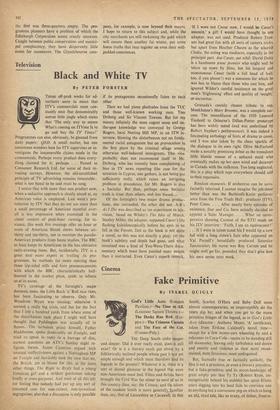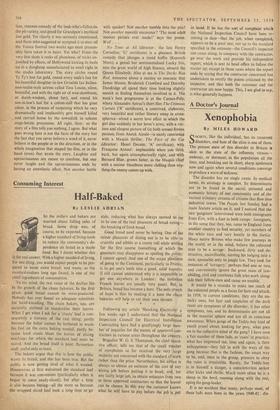Cinema
Fake Primitive
By ISABEL QUIGLY God's Little Acre. (London Pavilion.)—No Time at All. (Leicester Square Theatre.)— The Decks Ran Red. (Em- pire.)—The Crimson Curtain and The Face of the Cat. (Cameo-Poly.) THE Deep South sinks deeper and.deeper. Did it ever really exist, does it still exist? Or is it a literary myth put about by a folklorically inclined people whose past is not yet ample enough and which must therefore find its legends in the present? Whatever it is, there is a sort of dismal glamour in the legend that even non-Americans must feel. Films and fiction have brought the Civil War far closer to most of us in this country than, say, the Crimea; and the idiom of the modern South is more generally__4miliar than, say, that of Lancashire or Cornwall, In this South, Scarlett O'Hara and Baby Doll seem almost contemporaries, so imperceptibly do the years slip by; and when you get to the more primitive fringes of the legend, as in God's Little Acre (director : Anthony Mann; 'A' certificate), taken from Erskine Caldwell's novel, time— except for a few motor-cars wheezing by and a reference to Coca-Cola—seems to be standing still till doomsday, leaving only turbulence and desire and enmity and violence at their most sweat- stained, most ferocious, most undisguised.
But, factually true or factually unlikely, the film is not a primitive, or even a literary primitive, but a fake-primitive; and its moon-landscape of great empty pits that Ty Ty (Robert Ryan, un- recognisable behind his stubble) has spent fifteen years digging into his land fails to convince one as anything but a convenient peg on which to hang an old, tired tale, like so many, of defeat, frustra- tion, raucous comedy of the look-who's-fallen-in- the pit variety, and greed for Grandpaw's mythical lost gold. Yet clearly it was seriously intentioned, and those who suggested or accepted it to start off the Venice festival two weeks ago must presum- ably have taken it to heart. Yet who? From the very first shots it reeks of phoniness, of tricks un- justified by effects, of Hollywood kicking its heels up in a dungheap manufactured to smell right in the studio laboratory. The story circles round Ty Ty's lust for gold, round every male's lust for his beautiful daughter-in-law Griselda (an Italian- neo-realist-style actress called Tina Louise, silent, beautiful, and with the right air of wise-dumbness, or dumb-wisdom, about her), and round his son-in-law's lust for a cotton-mill that has gone silent, in the process of reopening which he very dramatically and implausibly gets himself killed and carried home by the townsfolk in solemn stage-heroic procession. All right, then : so the story of a film tells you nothing, I agree. But what goes wrong here is not the facts of the story but the fact that you never believe a word of it, never believe in the people or in the direction, or in the whole imagination that shaped the film, or in the hand (even) that wrote the story. Laughter and uproariousness are meant to combine, but one never laughs and the uproariousness ends by having an anaesthetic effect. Not another battle with spades? Not another tumble into the pits? Not another moonlit encounter? The most adult motion picture ever made!' says the poster. Well . . • No Time at All (director : the late Henry Cornelius; `I.J' certificate) is a pleasant British comedy that plunges a timid boffin (Kenneth More), a genial but sentimentalised Lucky Jim, into the great world of high finance, aboard the Queen Elizabeth. Also at sea is The Decks Ran Red, nonsense about a mutiny so moronic that James Mason, Broderick Crawford and Dorothy Dandridge all spend their time looking slightly seasick at finding themselves involved in it. The week's best programme is at the Cameo-Poly, where Alexandre Astruc's short film The Crimson Curtain ('X' certificate), a contrived, elaborate, very beautiful and rather literary essay in atmo- spherics—about a secret love affair in which the girl dies suddenly in her lover's arms, with a cur- ious and elocient picture of (in both senses) frozen passion, from Anouk Aimee—is nicely contrasted with a Maquis thriller, The Face of the Cat ,(director : Henri Decoin; 'A' certificate), with Francoise Arnoul : implausible when you think back, but again atmospherically right, and with Bernard Blier, grown fatter, as the Maquis chief with a sinister blandness more chilling than any- thing the enemy comes up with.



































 Previous page
Previous page